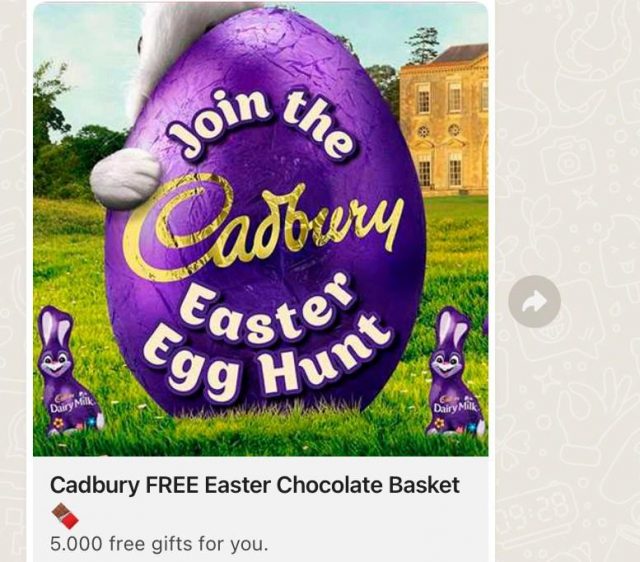With Easter being round-the-corner, have you received WhatsApp forwards that offer you free chocolates as a reward for an Easter Egg hunt? If yes, then beware! Although the promise of free chocolates is appealing, do not click on links in WhatsApp messages or provide personal information because all of this is a scam!
A group of researchers offered individuals the chance to win an Easter basket outside London’s Victoria station in 2006. They only had to fill out a simple form with a few personal details. Shockingly (or perhaps not so surprisingly), more than 80% of people gave up enough information for their identity to be stolen.
There doesn’t appear to have been much change over the years: we’re still enticed by the promise of free chocolate. Messages purporting to give a free Cadbury Easter chocolate basket are now being sent on WhatsApp.
It’s very similar to a scam in May 2020 that promised a Cadbury hamper if you forwarded a WhatsApp message to ten friends and then did a “few steps” afterward.
Theft Through Free Chocolates
A simple image of a purple Cadbury egg with the words ‘Join the Cadbury Easter Egg Hunt’ has been circulating on WhatsApp since the end of March 2022. A note appears beneath the image, implying that free chocolate baskets are available, as well as “5.000 free gifts for you.”
There’s a link to click on, and the scammers appear to have a number of them: some have been taken down, while others are still active. If you go through the link, you’ll be taken to a page that appears to be official, with several questions to answer before you can win the basket.
Scams like this prey on your fear of losing out by indicating how many free products are available in order to get you to jump through the hoops faster and, hopefully, not read what you’re signing up for too carefully.
The scammers seek your name, address, and possibly other personal information, that you would think is needed to give you the chocolate, but they then use that information to steal your identity and money.
The Reality
People have resorted to social media to point this out and complain about the overwhelming quantity of these messages they’re receiving from pals, but assertions that there’s “no Cadbury Easter egg hunt” aren’t totally accurate.
Cadbury is, in fact, hosting a Worldwide Hide event on its website (below). It is not, however, a competition, and no free chocolate is being given away.
Also Read: Cadbury’s New Ad Using AI Is Worth Watching For So Many Reasons
Red Flags To Spot
There are red flags everywhere, from the questionable wording to the link itself, which resembles one from the popular tinyurl service but adds a 2 and uses a.ru name, indicating that it is a Russian website.
Previous frauds have used a version on a theme that has been seen on all social media platforms, including WhatsApp and Facebook, for years. Cadbury is commemorating its anniversary by handing people free chocolate, as is the customary trick. You must forward the message in order to promote the fraud, and you will then be asked to complete a series of tasks before receiving your ‘free’ hamper.
Again, this should raise red flags because no authentic Cadbury – or any other reputable firm – would require you to complete bizarre survey questions, complete unrelated ‘deals’ with ‘partners,’ or even download applications as part of an offer.
If you’re not careful about what you click on, you could end up consenting to send premium text messages, which could cost you £200 each year, according to The Sun. And because this is added to your phone bill, a few £1.50 texts every month may go unnoticed.
If you don’t know who is conducting the survey, answering questions is likewise a terrible idea. Handing over personal information while joining competitions, just as that in-person poll at Victoria station, is always a risk. It used to result in a flood of junk mail coming in your mailbox, but now fraudsters are using it to steal your identity and money.
Most of the time, all you have to do to discover if an offer is genuine is go to the company’s website or official social media pages and see if the promotion is still active. Whether all else fails, and anything is being given by a company you’re unfamiliar with, either do your investigation to see if it’s authentic, or don’t deal with it at all.
The signs that this latest letter is a hoax should be evident, but just to be clear: there is no free Easter chocolate basket to be had. It’s a scam.
Cadbury Warns About Scamsters In Response
Cadbury has always been upfront about con artists.“ Promotions of this kind will always be announced on Cadbury’s official channels. We do not advise fans to take part… share personal data or share the message within their networks.”
According to a spokeswoman for Mondelez (the company that owns Cadbury), “We’ve been made aware of social media posts purporting to offer consumers a free Easter chocolate basket. We can confirm that this was not sent by us, and we would advise consumers not to connect with it or give personal information.
Customer security is a top priority for us, and we’re working with the appropriate organizations to rectify the issue.”
You should consider twice before forwarding messages to your pals on WhatsApp, Facebook, or any other social media platform, whether it’s free chocolate or the all-time favourite bait, a free iPhone.
Have you ever been fooled by such scams? Let us know in the comments down below!
Disclaimer: This article has been fact-checked
Sources: Tech Advisor, Info Security +more
Image Source: Google Images
Find the blogger @ParomaDey
This post is tagged under cyber crime, cyber law, scam, hacker, misinformation, disinformation, social media, Cadbury, Mondelez, chocolate, easter
We do not hold any right, copyright over any of the images used, these have been taken from Google. In case of credits or removal, the owner may kindly mail us.
Other Recommendations:
What Is This New ’Hello Mum’’ Or ‘’Hello Dad’’ Scam On WhatsApp








































